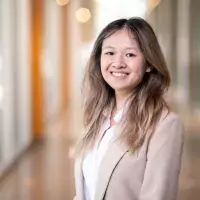
Lauren Zung
MDS Vancouver, Class of 2023
During Lauren Zung’s undergrad, she signed up for a programming course on a whim and discovered how much she enjoyed it.
“I decided to take more electives over the years in data structures and algorithms, statistical modeling, database design, and applied machine learning and found a particular interest in data science,” Zung explained.
Zung completed her Bachelor of Science in Behavioural Neuroscience in May 2022 from the University of British Columbia (UBC) and during the last year of her studies, she worked as a junior data scientist for the UBC Digital Emergency Medicine lab where she was developing machine learning models to aid in the detection of lung pathologies.
“Following my experience as a junior data scientist, I felt that I had much more to learn and was not sure how to go about developing my skills,” she said. “I was familiar with parts of the toolkit but lacked the confidence to support my analyses without knowing when to use what and why.”
Zung was looking for a streamlined program that could cover the necessary background for a role in data science. This led her UBC’s Master of Data Science (MDS) program and its comprehensive curriculum that would provide her the breadth and depth of knowledge that she wanted.
“I liked that the program was condensed into 10 months, as I was eager to get started in industry after having just finished my bachelor’s. I also thought that it was a good fit for me as someone who does not have a traditional “technical” background, as the program is tailored to individuals who are coming from a variety of expertise,” she said.
Zung added that MDS’ curriculum was well-rounded, allowing her and her cohort to hone industry-ready skills and apply them with realistic data sets.
In addition, she found the MDS faculty were not afraid to delve deeper when students asked questions, challenged them with ground-breaking material, or just have a genuine conversation outside of coursework.
As well, Zung said that the capstone project was the most rewarding part of the program for her as it allowed her to see the culmination of those skills learned in the final product.
“This is a great environment to test out different approaches with relatively few barriers and see what we can achieve under a tight timeline,” she explained.
For Zung, capstone was an opportunity to work in a domain completely outside her comfort zone, which led her to work on a project that leverages computer vision techniques to segment satellite images. “I had no prior experience in environmental engineering or anything remotely similar, so this was a nice opportunity for me to try something that I may not get to during my career.”
Zung also found her fellow cohort as one of the best parts of the MDS program.
“Everyone is so supportive of one another, which is needed when we are going through such a rigorous and intense program. Since we are in the same lectures and labs each day, we truly build a sense of community over the 10 months,” she explained.
With the program now over, Zung feels much more confident in her abilities, which she will bring to her job search. “Given the breadth of knowledge that I have gained, I feel that I can apply for a wider variety of roles in statistics, machine learning or programming, and am prepared with skills to handle any type of data analysis challenge.”
The jobs that Zung is seeking are data scientist and machine learning engineering roles in the biotech industry but isn’t opposed to seeking opportunities in other fields given her experience with her capstone project.
Lauren’s Top 3 Tips on Succeeding in the MDS Program:
- Start on materials early to give yourself time to rest and take breaks. It is an intense 10 months, so you want to be able to absorb as much as you can each week, and cramming will eventually take a toll. I think prioritizing assignments as soon as possible allowed me to maintain a good work-life balance.
- Take time to network and build relationships with your colleagues. There are many opportunities to work with different individuals throughout the program so be sure to capitalize on them, since you never know when that connection may lead to your next job referral!
- Don’t be afraid to work on side projects or attend events outside of the program. Vancouver is a major city and UBC has tons of clubs and organizations, so there is always something going on. I was jumping at as many chances as I could get to apply my skills and learn new ones (hackathons, workshops, tutorials), and this was a great supplement to what I was covering in MDS.
